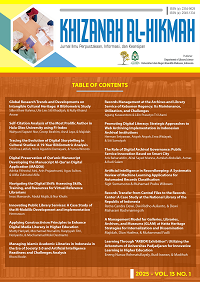Managing Islamic Academic Libraries in Indonesia in the Era of Society 5.0 and Artificial Intelligence
Readiness and Challenges Analysis
DOI:
https://doi.org/10.24252/v13i1a8Keywords:
Library Management, Islamic Academic Libraries, Tecnology in Library, Technology Acceptance, Librarian CompetenciesAbstract
This study analyzes the readiness and challenges encountered by Islamic academic libraries in Indonesia in adapting to AI-driven digital transformation. Employing a literature review approach, the research synthesizes findings from academic studies, institutional reports, and related literature to examine four central aspects: technological readiness, focusing on the adoption of AI and automation in library operations; human resource readiness, assessing librarians’ competencies in managing digital systems; implementation challenges, identifying obstacles such as limited infrastructure, financial constraints, and digital literacy deficits; and development strategies, offering recommendations to enhance digital library services while upholding Islamic educational values. The findings revealed that while several Islamic academic libraries have initiated steps toward digitalization, persistent barriers hinder comprehensive implementation. Notably, disparities in infrastructure and professional capacity highlight the urgent need for strategic action. The study concludes that successful digital transformation requires sustained investment in technology, ongoing professional development for librarians, and inter-institutional collaboration. Strengthening these areas will enable Islamic academic libraries to evolve into dynamic digital knowledge hubs that contribute meaningfully to academic advancement in the Society 5.0 era.
Downloads
References
Amaliah, E., Sholiha, N. A., Iqbal, R., & Zahro, F. M. (2024). Implementation of Islamic University Libraries in the Digital Era 4.0. 05(01), 1–10. https://doi.org/10.24042/el-pustaka.v5i1.22431
Efendi, Z., Hisyam, W. N., & Faristiana, A.R. (2023). Kurangnya Minat Baca Buku Kalangan Mahasiswa. Student Scientific Creativity Journal, 1(4), 382–398. https://doi.org/10.55606/sscj-amik.v1i4.1676
Eje, C. O. & Dushu, T. Y. (2018). Transforming Library and Information Services Delivery Using Innovation Technologies. Library Philosophy and Practice (e-journal). https://digitalcommons.unl.edu/libphilprac/2036/
G. S., C., & Mulimani, M. (2024). The Impact of Artificial Intelligence on Library and Information Science (LIS) Services. SSRN Electronic Journal, May. https://doi.org/10.2139/ssrn.4856459
Ginting, R. T., Samosir, F. T., Yurinda, A. D., Majidah, & Madu, A. U. (2023). The Role of Librarians in The Era of Society 5.0: Missing or Increasing Importance? Record and Library Journal, 9(1), 159–171. https://doi.org/10.20473/rlj.V9-I1.2023.159-171
Hamudy, M. I. A., Rifki, M. S., & Hayuningtyas, M. (2024). Regional library infrastructure management for service improvement in Bangka Belitung Islands Province. 12(2), 279–294. https://doi.org/10.24198/jkip.v12i2.56507
Huang, Y., Cox, A. M., & Cox, J. (2023). Artificial Intelligence in academic library strategy in the United Kingdom and the Mainland of China. Journal of Academic Librarianship, 49(6), 102772. https://doi.org/10.1016/j.acalib.2023.102772
Kalangit, W., Masengi, E. V., Pangkey, I., & Mandagi, M. (2022). Human Resources Development In Bitung City Library Service. Technium Social Sciences Journal, 28(December), 17–31. https://doi.org/10.47577/tssj.v28i1.5742
Lamba, M. (2022). Technological Advancements in Library Service Innovation. In Advances in Library and Information Science: Vol. i. http://dx.doi.org/10.4018/978-1-7998-8942-7
Makarti, D., & Lestari, A. (2025). Exploring The Role of Artificial Intelligence in Library Management at Public Primary School. 5(1), 41–45. https://doi.org/10.52088/ijesty.v5i1.626
Mazhar, S. A. (2021). Methods of Data Collection: A Fundamental Tool of Research. Journal of Integrated Community Health, 10(01), 6–10. https://doi.org/10.24321/2319.9113.202101
Nasir, M. & Tyagi, P. (2023). Transforming Academic Libraries for the Future: Adapting to Changing Times.
Nicmanis, M. (2024). Reflexive Content Analysis: An Approach to Qualitative Data Analysis, Reduction, and Description. International Journal of Qualitative Methods, 23, 1–12. https://doi.org/10.1177/16094069241236603
Nurdiana, R., Effendi, M. N., Ningsih P. K., & Abda, M. I., & Aslan. (2023). Collaborative Partnerships for Digital Education To Improve Students’ Learning Achievement At the Institute of Islamic Religion of Sultan Muhammad Syafiuddin Sambas, Indonesia. International Journal of Teaching and Learning (INJOTEL), 1(1), 1–15. https://injotel.org/index.php/12/article/view/1/10
O, Gorman, K. D. & MacIntosh, R. (2015). Research Methods for Business and Management 2nd edn. Oxford: Goodfellow Publishers http://dx.doi.org/10.23912/978-1-910158-51-7-2736
Persadha, D., Judijanto, L., Susanti, M., & Reza, H. K. (2024). Data Privacy and Security Protection Strategies in Library Electronic Resources Management. Holistik Analisis Nexus, 1(7), 115–122. https://doi.org/10.62504/nexus742
Phamela, N., Ayogeboh, Z., Nkomo, N., Mthalane, P. P., Luthuli, M., Khumalo, M., & Phokoye, S. (2024). A review of artificial intelligence implementation in academic library services. 90(2), 1–8. https://doi.org/10.7553/90-2-2399
Puspita, D., Roisah, K., & Lestari, S. N. (2024). Open Access Institutional Repository in the Digital Era: Preventing or Increasing Plagiarism? Yustisia, 13(2), 168–188. https://doi.org/10.20961/yustisia.v13i2.85098
Rodin, R. (2020). Analisis Problematika Perpustakaan Perguruan Tinggi Islam Di Indonesia Menghadapi Era 4.0. LIBRARIA: Jurnal Perpustakaan, 7(2), 297. https://doi.org/10.21043/libraria.v7i2.6505
Rohayati, Y., & Abdillah, A. (2024). Digital Transformation for Era Society 5.0 and Resilience: Urgent Issues from Indonesia. Societies, 14(12), 1–16. https://doi.org/10.3390/soc14120266
Syukur, F., Maghfurin, A., Marhamah, U., & Jehwae, P. (2024). Integration of Artificial Intelligence in Islamic Higher Education: Comparative Responses between Indonesia and Thailand. Nazhruna: Jurnal Pendidikan Islam, 7(3), 531–553. https://doi.org/10.31538/nzh.v7i3.13
Tim. (2024). Modul Manajemen Kelembagaan Perpustakaan, serta Pengembangan dan Pengolahan Bahan Pustaka.
Yuliati AS, Ernawati, S., Saputra, H., & Kurniawan, M. A. (2024). Islamic Education Management Strategy in the Digital Era : Governance Transformation to Increase Effectiveness and Accessibility. International Journal of Islamic Educational Research, 1(3), 27–44. https://doi.org/10.61132/ijier.v1i3.67
Downloads
Published
How to Cite
Issue
Section
License
Copyright (c) 2025 Rhoni

This work is licensed under a Creative Commons Attribution-NonCommercial-ShareAlike 4.0 International License.
By submitting your manuscript to our journal, you are following Copyright and License



